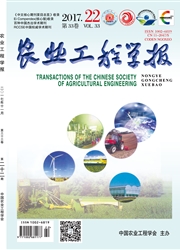

 中文摘要:
中文摘要:
低温等离子体(non-thermal plasma,NTP)发生器放电产生的活性物质可有效去除柴油机颗粒捕集器(diesel particular filter,DPF)中沉积的颗粒物(particulate matter,PM),而发生器的工作参数直接影响活性物质的浓度,选取合适的工作参数有利于活性物质的产生。该文以空气为气源,考察了放电区表面温度、放电电压、放电频率、空气流量4个因素对NTP发生器产生活性物质浓度的影响。以O3质量浓度作为试验指标,进行了正交试验设计,并对试验结果进行单因素影响规律的分析、极差分析以及方差分析。研究表明:较低的放电区表面温度和放电频率有利于O3的生成,O3质量浓度随着空气流量的增大先升高后降低,随放电电压的变化没有明显的增减趋势;放电区表面温度、空气流量为显著因素,放电电压和放电频率为不显著因素;各因素对试验结果影响的大小顺序为:空气流量〉放电区表面温度〉放电频率〉放电电压;NTP反应器产生活性物质的较优组合是:放电区表面温度40℃、放电电压19kV、放电频率7kHz、空气流量5L/min。研究结果对开发用于分解柴油机PM的NTP系统、优化NTP技术再生DPF的研究有重要的指导意义。
 英文摘要:
英文摘要:
Diesel engines are widely used in the field of industrial and agricultural production and transportation for their good economy and dynamic performance. However, with emission regulation becoming gradually stricter, how to reduce diesel particulate matter (PM) emissions effectively has become a growing concern of people. Diesel particulate filter (DPF) are considered to be the most effective means to reduce emissions of particulate matter, and the key of DPF lies in their regeneration. DPF regeneration is usually divided into two categories: active regeneration and passive regeneration. Active regeneration refers to the combustion of PM directly heated by external energy and the temperature is usually above 650~C. There are many methods of active regeneration, such as electric heating, microwave heating and combustion heating with the injected fuel. But there are many problems of these methods of regeneration, such as energy consumption, high cost and thermal damage of the carrier structure. Passive regeneration means to achieve regeneration by improving exhaust temperature to reach the minimum combustion temperature of the regeneration without the extemal auxiliary. There are many problems of passive regeneration problem, such as sulfur poisoning of the catalyst and low regeneration efficiency. Non-thermal plasma (NTP) technology can effectively remove the PM deposited in the DPF and it provides a new method for the DPF regeneration. The oxidation of the active substances produced by NTP reactor is stronger than O2 and PM can be well oxidized by these active substances. The working parameters of NTP reactor directly affect the concentration of the active substances, so suitable working parameters are conducive to the regeneration of active substances. This article discusses four working parameters of NTP reactor which affect the concentration of the active substances. The four factors are the surface temperature of discharge area, discharge voltage, discharge frequency and air flow. For the multi-f
 同期刊论文项目
同期刊论文项目
 同项目期刊论文
同项目期刊论文
 Raman Spectroscopy Analysis of Carbon Structural Evolution of Diesel Particulate Matters with the Tr
Raman Spectroscopy Analysis of Carbon Structural Evolution of Diesel Particulate Matters with the Tr Influence on component and thermo-gravimetric characteristics of diesel particulate matter by NTP te
Influence on component and thermo-gravimetric characteristics of diesel particulate matter by NTP te Investigation of non-thermal plasma decomposing NO in N2/NO mixtures based on optical emission spect
Investigation of non-thermal plasma decomposing NO in N2/NO mixtures based on optical emission spect Direct non-thermal plasma technology reduces emission of aldehyde and ketone in diesel engine exhaus
Direct non-thermal plasma technology reduces emission of aldehyde and ketone in diesel engine exhaus Experimental study on removal of NOx by NTP assisted LaMnO3 and La0.8K0.2MnO3 catalysts for diesel e
Experimental study on removal of NOx by NTP assisted LaMnO3 and La0.8K0.2MnO3 catalysts for diesel e Experimental investigation of the influence of DNTP on mass size distribution of diesel engine parti
Experimental investigation of the influence of DNTP on mass size distribution of diesel engine parti 期刊信息
期刊信息
